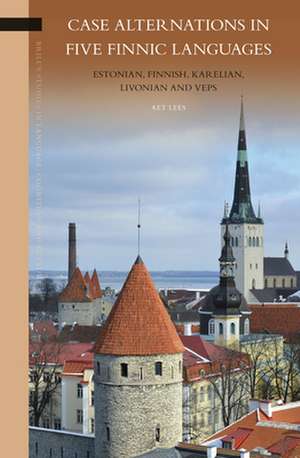Case Alternations in Five Finnic Languages: Estonian, Finnish, Karelian, Livonian and Veps: Brill's Studies in Language, Cognition and Culture, cartea 13
Autor Aet Leesen Limba Engleză Hardback – 4 iun 2015
Din seria Brill's Studies in Language, Cognition and Culture
- 15%
 Preț: 636.92 lei
Preț: 636.92 lei - 18%
 Preț: 634.82 lei
Preț: 634.82 lei - 18%
 Preț: 727.99 lei
Preț: 727.99 lei - 18%
 Preț: 681.15 lei
Preț: 681.15 lei - 18%
 Preț: 522.06 lei
Preț: 522.06 lei - 18%
 Preț: 636.47 lei
Preț: 636.47 lei - 18%
 Preț: 703.78 lei
Preț: 703.78 lei - 15%
 Preț: 503.69 lei
Preț: 503.69 lei - 18%
 Preț: 546.00 lei
Preț: 546.00 lei - 18%
 Preț: 889.17 lei
Preț: 889.17 lei - 18%
 Preț: 524.79 lei
Preț: 524.79 lei - 18%
 Preț: 659.85 lei
Preț: 659.85 lei - 18%
 Preț: 763.68 lei
Preț: 763.68 lei - 18%
 Preț: 903.60 lei
Preț: 903.60 lei - 18%
 Preț: 791.45 lei
Preț: 791.45 lei - 18%
 Preț: 606.87 lei
Preț: 606.87 lei - 18%
 Preț: 771.68 lei
Preț: 771.68 lei - 18%
 Preț: 595.58 lei
Preț: 595.58 lei - 18%
 Preț: 590.89 lei
Preț: 590.89 lei - 18%
 Preț: 632.38 lei
Preț: 632.38 lei - 18%
 Preț: 605.47 lei
Preț: 605.47 lei - 18%
 Preț: 580.76 lei
Preț: 580.76 lei - 18%
 Preț: 753.78 lei
Preț: 753.78 lei - 18%
 Preț: 888.81 lei
Preț: 888.81 lei - 18%
 Preț: 635.13 lei
Preț: 635.13 lei - 18%
 Preț: 635.13 lei
Preț: 635.13 lei - 18%
 Preț: 803.22 lei
Preț: 803.22 lei - 18%
 Preț: 635.24 lei
Preț: 635.24 lei - 18%
 Preț: 582.69 lei
Preț: 582.69 lei - 18%
 Preț: 556.04 lei
Preț: 556.04 lei - 18%
 Preț: 690.15 lei
Preț: 690.15 lei - 18%
 Preț: 682.28 lei
Preț: 682.28 lei - 18%
 Preț: 777.74 lei
Preț: 777.74 lei - 18%
 Preț: 575.74 lei
Preț: 575.74 lei
Preț: 679.99 lei
Preț vechi: 829.26 lei
-18% Nou
Puncte Express: 1020
Preț estimativ în valută:
130.12€ • 136.20$ • 108.30£
130.12€ • 136.20$ • 108.30£
Carte indisponibilă temporar
Doresc să fiu notificat când acest titlu va fi disponibil:
Se trimite...
Preluare comenzi: 021 569.72.76
Specificații
ISBN-13: 9789004296343
ISBN-10: 9004296344
Pagini: 426
Dimensiuni: 155 x 235 mm
Greutate: 0.77 kg
Editura: Brill
Colecția Brill
Seria Brill's Studies in Language, Cognition and Culture
ISBN-10: 9004296344
Pagini: 426
Dimensiuni: 155 x 235 mm
Greutate: 0.77 kg
Editura: Brill
Colecția Brill
Seria Brill's Studies in Language, Cognition and Culture
Notă biografică
Aet Lees, M.D. (1972),NSW; B.A. (1996), Sydney University; Honorary Associate, Department of Linguistics. Publications in the Proceedings of the Australian Linguistic Society 2003-2009; "Necessive constructions in Finnic Bible texts". In Santos, D. et al.(eds), Shall We Play the Festschrift Game? (2012).
Recenzii
"This book is a valuable source of information about case-marking in Finnic languages, and will be of interest for those working on this group of languages and/or on case in general."
-Alan Reed Libert, University of Newcastle, in AUSTRALIAN JOURNAL OF LINGUISTICS, Volume 40, Issue 2
-Alan Reed Libert, University of Newcastle, in AUSTRALIAN JOURNAL OF LINGUISTICS, Volume 40, Issue 2
